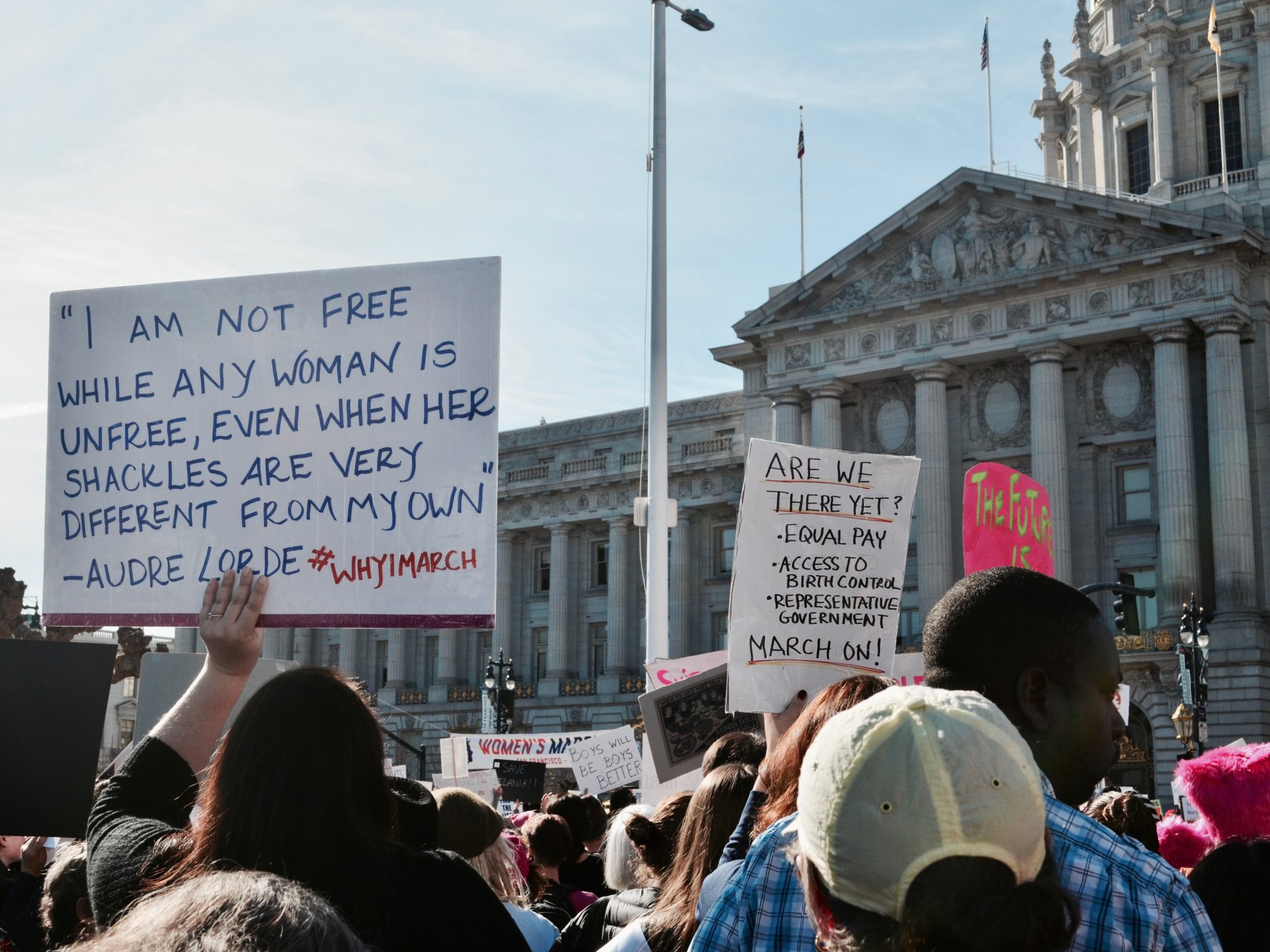“I am not free while any woman is unfree, even when her shackles are very different from my own”
– Audre Lorde
–
On January 21st, 2017, people in cities across the US (and even on a worldwide scale, as the same happened in cities across other continents) went out on the streets protesting, advocating not only for their own rights as women, but also for the rights of unprivileged minorities, for better healthcare, for immigration reform, for reproductive rights and for keeping Planned Parenthood alive and breathing, for the LGBT community, against racism and censorship, against discrimination. Donald Trump had recently been elected president, as the whole world watched silently, feeling powerless and speechless, as the man who took over one of the most important offices in the world – whether we, as the snobby Europeans that we are, choose to refuse it as such – and mindlessly dictated terrifying goals for his presidency, claiming to build walls and kick millions of people out of the country, defund important public organisms and destroy decades of precious work that both women and minorities had come to build in the country.
One year later, on January 20th, 2018, women did the same thing they had done one year prior – they took to the streets, they marched and protested, and they screamed at the top of their lungs. I say women, but not just women – an immense group of individuals, families, conglomerates of people united by the same values, all chanting for the same causes. As I got on the Caltrain to San Francisco that early Saturday morning – a 1-hour-and-15-minutes trip up from the lower part of the Peninsula where Stanford is located up to the lovely city -, I wondered just what kind of protest I would eventually face. I had a (thankfully) short-lived activist career within the academic world in Lisbon. I applied to be president of the Students’ Association and I lost (friends from FCSH, if you’re reading this – aren’t we all kind of glad that that happened? How relieved are we, really?). I had been to protests, I had painted banners, I had sung chants and held speakerphones and walked down some of the busiest avenues in the city protesting for lower tuitions, for better studying conditions, for more scholarships and financial support, for a public school system that worked. Today, as I look back, it all felt somewhat pointless – and I realize this might be a polemic statement, so my activists friends, please forgive me, as I am not discrediting your beliefs -; I had begun to think that isolating ourselves into these tiny communities and fighting for very specific agendas was purposeless and did not bring any kind of dialogue or growth.
That January morning, I met up with a friend and together we waled to the Civic Center Plaza, where we were greeted by a community of people that were brought together by the apparent diversity of their causes; yet what truly mattered was the unity of their purpose – to fight the oppression of a shapeless and corrupted government masked by a seemingly-democratic process.
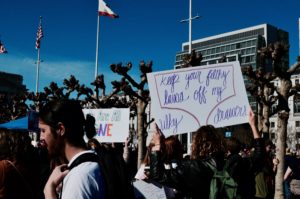

–
I have a very clear memory of the moment I found out that Trump had been elected. Back in that fatidic day in early November 2016, I had just got up at around 5am – at the time, I was working shifts from 7am to 4pm in a company relatively far from the where I was living, living the over-qualified-recent-grad-minimum-underpaid-wage dream of working at a callcenter – and as I was having a very early breakfast, still sleeping on my two feet, I picked up my phone and started going through the news. The first thing that popped up on the screen were the ongoing results and votes from the election, which were still being counted at the time. But at that point, it was fairly obvious to everyone that Trump had a clear advance and that it was likely he would win the whole election. I just stood there, speechless, going through other news sites and hoping that it wasn’t true.
At the time, selfish me already knew that she would be coming to live in the US for a while, she just didn’t know exactly where she would be placed. Applications for Masters were still going on at the time, and I was busy preparing portfolios for two upcoming applications – one of which was for Stanford, where I ended up. A million thoughts started running through my head and I started questioning whether it would be a good idea to come at all – tensions were arising and no one knew just what could happen. I remember joking with some of my friends saying that now that Trump was president I didn’t really want to come here anymore; they encouraged me to move anyway, they said “but it’s such an interesting time to be in America, though!”, as if this country had suddenly become a social experiment that one simply had to witness. “What a great time to be alive and well in America”, they said.
I guess it depends on just who you are, and what part of the world you come from.
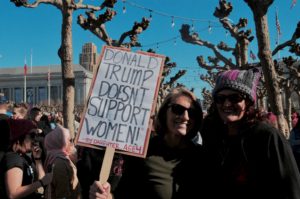
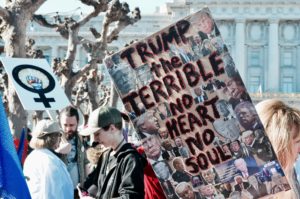
–
There’s this eternal debate among foreign students in colleges across America – okay, maybe that’s a broad statement, but it’s definitely something that has come up in conversation with other students – on whether or not we are considered immigrants. Simply put, the concept of immigrant is changing more quickly than we can perceive it, but its political connotation is something that we cannot ignore. Most of us have it better than the majority of people – we move here with significant financial support from scholarships and other funds, a stable network of connections and a whole system to prevent us from failing (even if this system often fails at making you supported – but I will elaborate on this later on); most of us can make the privileged choice of going back home, as none of us left to escape from something that could harm us (does lack of opportunities count?). We are expatriates, at the most, who actively choose to leave our home country for something that we perceive as better and where we have more opportunities; if we couldn’t move, it would have still been somewhat okay, perhaps not as we would have wanted it to be, but still okay. Yet there is a different perception of immigrants that we cannot ignore, one that I could never fit my own self into – people who, like us, leave their homes in search of better lives, yet with the uncertainty and instability of someone who may never be able to go back to their home at all. And that is what it is like today to be an immigrant in America – to live in constant fear and uncertainty, looking over your shoulder, attempting to fit in but being constantly forced out, continuously looking for signs of possible ICE raids – power plays which terrorize neighbourhoods, destroy communities, break up families and often send people to their demise.
I have said this a million times before and I will say it again – America is unique in the way that it was founded, as a hodpodge of cultures and identities that do not coexist anywhere else in the world. Sure, one can often argue that globalization and the openness of today’s frontiers are changing this, but the idea of America seems to be based on the whole principle of diversity agnd multiplicity. And when one thinks about America, one cannot ignore that its core has been supported and built by the immigrants it constantly tries to push out – and mind you, there is nothing new or groundbreaking in what I am saying, but merely a confirmation of what seems to be a scary idea for a significant portion of Americans.
I am not one of those immigrants that had helped build a country – if anything, right now I am probably closer to the stereotype of the parasitic kind of immigrant that people (Trump electorate?) tend to think of – the foreign student who comes in, takes advantage of a private education at one of the world’s most acknowledged universities and leaves to go back to her own country or to go somewhere else. However, I have welcomed this country, its people and its idiosyncrasies into my life with an open heart – even if sometimes, I find myself missing home – and to give back my all. In the 6-month-anniversary of my move here, I do believe my own self and my own way of thinking and perceiving life has already changed – and simultaneously, so has, in a own way, my identity. I am more of a conglomerate of places than I ever was before, and while my roots stay firm in the ground of the country in which I was born, my branches grow in different directions.
It is interesting, though, how we only think about our roots when we are transplanted to some place else. How I only think about belonging and home when I am far away from my own place. And how my identity, even if I have only been here for about six months, has already changed somehow to incorporate this new perception of lifee, of public space, of a culture that’s more heterogenous than mine ever was and ever will be – there are new boundaries that have to be enforced, new debates that come up, new ways to interact and to discuss with people. New concepts, new discussions to be had, new readings to be made – and I’m learning more and more about it everyday.
Today and will forever carry with me an experience of a place that I forever dreamt about, and that is so much more complicated and intriguing than I thought it ever could – a place that surpasses all stereotypes, all Hollywood representations, all Trump-related jokes, all literary clichés. A place of landscapes molded by people and people molded by landscapes, a place as diverse as the terrain that composes it, a place that has a soul that goes beyond its political stances and that is visible on the faces and hands of its people.
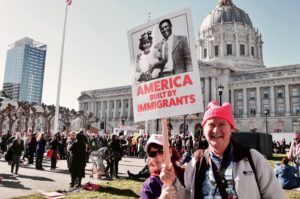
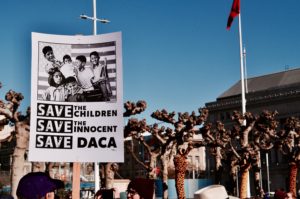
–
It’s a scary time to be young and alive and knowing that there are a lot of issues we will have to inherit from the previous generations.
I’ve come to America to study cinema and make documentaries, and people often ask me in a casual and nonchalant way about “what kind of documentaries I like to make”. I am yet to understand just what “kind” means in this context, as people clearly make up in their own minds what categories of films (and documentaries, for that matter) they consider to be important, political (ahem, isn’t all documentary cinema, regardless of how experimental or traditional it may be, and regardless whatever themes or ideas it focuses on, somehow political? Just some food for thought), necessary – in a world of continuous search for goods of immediate consumption, fulfillment and gratification, we need things to be ready when we want them to be, and in the saturated context of content and media that we, as simultaneous audiovisual content makers and consumers, have to create and navigate, it can be difficult to make films that people find relevant and important to watch. Relevance seems to equal immediacy, or currentness.
I have found that most people find my films irrelevant in this immediate picture. I like to think that my films are political, yes, but I strive for timelessness and atemporality – I do not want them to be dated statements that come from a specific period of time, or films that recur to artificial trends and forms that, however promising, fail to deliver in depth and end up becoming futile devices. I would like to make pieces that have significance through the eras: films that, regardless of when they will be watched, they will still feel current. Now, I’m sure one could say that this is what all filmmakers strive for, yet I often wonder just how many make conscious choices towards this.
I have always tended to look at bigger pictures, to search for the contexts within all these issues take place, to think about the weight of history and trauma, to look back on the past and bring it to the present rather than contemplating the present alone, to attempt making bigger statements that surpass and transcend the immediate world in which e live in.
In the past, and for the fact that the pieces that I made were not directly social-issue-statements, I have gotten some sort of backlash from activist friends who claim these films to be bourgeois statements on life. In times of crisis and tension, filmmakers have the added responsibility of documenting, of remembering, of bringing to light the stories that fall between the cracks of public discourse and political agendas – and these include, to the vast extension, both social-issue-pieces and contemplative works, both immediate problems and questions that have stayed for the ages. One kind of filmmaking should not surpass or take over the other – there is space for coexistence and collaboration.
Now is the time to make films about anything – about the things that matter and the things that seemingly don’t, about the current and the transcendental, about life and death, about being human.
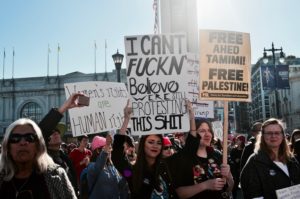
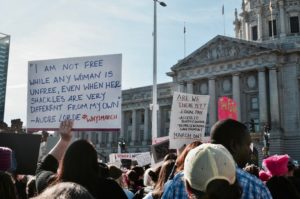
– Inês
